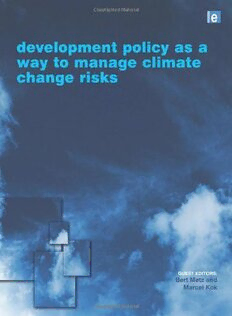Download Development Policy as a Way to Manage Climate Change Risks (Climate Policy Series) PDF Free - Full Version
Download Development Policy as a Way to Manage Climate Change Risks (Climate Policy Series) by Bert Metz, Marcel Kok in PDF format completely FREE. No registration required, no payment needed. Get instant access to this valuable resource on PDFdrive.to!
About Development Policy as a Way to Manage Climate Change Risks (Climate Policy Series)
The integration of development and climate objectives is increasingly recognized as significant in research and policy making. In practice, some development aims, such as poverty alleviation, enhancing energy security and access or improving health, also have potential climate benefits. The challenge is to find a broadly applicable range of effective policies and actions that realize development objectives and at the same time result in real climate benefits. This special issue of the Climate Policy journal focuses on new evidence that identifies options for action, examining how development strategies, policies and decisions can be made more sustainable by integrating climate change considerations and overcoming the barriers that hinder implementation. It also explores what lessons exist for policy at the national and international level and looks at how promising options for local policies can be scaled-up through international initiatives. It also examines how international policy frameworks can create the conditions for integrated development and climate policies. The outcomes provide useful contributions to sustainable development planning on issues such as poverty reduction, rural development, disaster preparedness, energy and transport as well as to the discussions at national and international level regarding next steps to deal with climate change.
Detailed Information
| Author: | Bert Metz, Marcel Kok |
|---|---|
| Publication Year: | 2008 |
| ISBN: | 9781435691445 |
| Pages: | 145 |
| Language: | English |
| File Size: | 1.343 |
| Format: | |
| Price: | FREE |
Safe & Secure Download - No registration required
Why Choose PDFdrive for Your Free Development Policy as a Way to Manage Climate Change Risks (Climate Policy Series) Download?
- 100% Free: No hidden fees or subscriptions required for one book every day.
- No Registration: Immediate access is available without creating accounts for one book every day.
- Safe and Secure: Clean downloads without malware or viruses
- Multiple Formats: PDF, MOBI, Mpub,... optimized for all devices
- Educational Resource: Supporting knowledge sharing and learning
Frequently Asked Questions
Is it really free to download Development Policy as a Way to Manage Climate Change Risks (Climate Policy Series) PDF?
Yes, on https://PDFdrive.to you can download Development Policy as a Way to Manage Climate Change Risks (Climate Policy Series) by Bert Metz, Marcel Kok completely free. We don't require any payment, subscription, or registration to access this PDF file. For 3 books every day.
How can I read Development Policy as a Way to Manage Climate Change Risks (Climate Policy Series) on my mobile device?
After downloading Development Policy as a Way to Manage Climate Change Risks (Climate Policy Series) PDF, you can open it with any PDF reader app on your phone or tablet. We recommend using Adobe Acrobat Reader, Apple Books, or Google Play Books for the best reading experience.
Is this the full version of Development Policy as a Way to Manage Climate Change Risks (Climate Policy Series)?
Yes, this is the complete PDF version of Development Policy as a Way to Manage Climate Change Risks (Climate Policy Series) by Bert Metz, Marcel Kok. You will be able to read the entire content as in the printed version without missing any pages.
Is it legal to download Development Policy as a Way to Manage Climate Change Risks (Climate Policy Series) PDF for free?
https://PDFdrive.to provides links to free educational resources available online. We do not store any files on our servers. Please be aware of copyright laws in your country before downloading.
The materials shared are intended for research, educational, and personal use in accordance with fair use principles.

